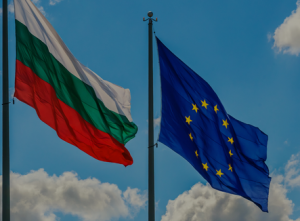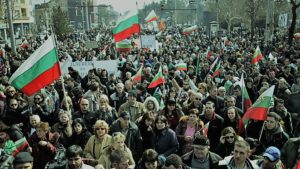How did Bulgaria change after becoming an EU member

Very often I was asking m yself in what condition was Bulgaria before entering the EU and what happened 5 years later. I have mixed feelings about this period, therefore I will share some positives and negatives. On the 1st of January 2007 Bulgaria became an EU member. This was one of the most important events in the new history of our country. As new European members our self-confidence has raised, our hopes became bigger and we started to believe more in the progress of the nation.The Bulgarian people have been through a painful transition, pseudo-democracy, post-communist slogans and in o’s turn we were delighted of that ray of light in the end of the tunnel.
yself in what condition was Bulgaria before entering the EU and what happened 5 years later. I have mixed feelings about this period, therefore I will share some positives and negatives. On the 1st of January 2007 Bulgaria became an EU member. This was one of the most important events in the new history of our country. As new European members our self-confidence has raised, our hopes became bigger and we started to believe more in the progress of the nation.The Bulgarian people have been through a painful transition, pseudo-democracy, post-communist slogans and in o’s turn we were delighted of that ray of light in the end of the tunnel.
In Bulgaria the world financial crisis was noticed with some delay, even though the first nuance of it started yet in the year of 2007. In that time I left the country as did a lot of my fellow-citizens. We realized we had more freedom and we wanted to see how people live on West. This was our first chance. The number of the immigrants has increased, because we were looking for the change. Most of the valuable cadres were in a hurry to find new and better paid jobs in the Western Europe. All those strong countries didn’t welcome us with open arms and were quite skeptical to the new European members.
In 2007 Bulgaria was ruled by the Triple Coalition who made the dream of million Bulgarians to come true and namely to become EU members. That moment was a hot spot in our history and a big success for the whole nation. With our entering in Europe there was a guarantee for a stable and predictable business environment. Even though the Triple Coalition was accused in lots of thefts, corruption, fraud and unscrupulous ruling exactly at that time Bulgaria was experiencing financial stability, the monetary reserves has increased, as the Currency Board was saved with unchanged and fixed course of the national currency. The support of the macroeconomic and the fiscal stability has led to increased temps of economic development and the consecutive tax politic has created favorable environment for investments in the economy. In 2007 Bulgaria was among the countries with the lowest taxes as the corporative tax was decreased to 10%. The national finances were finishing with budget excess, but were spent not very transparent for projects with disputable effect. Banks were stable as none of them has faced bankrupt in the coming crises and the foreign investments have reached the maximum level since the period of transition. This was cooperated by the ultimate liberal tax system and the simplified social insurance. The economic growth was way above the period of previous governments. This political and economic dynamics allowed the life standard of the average citizen to increase. There were a lot of changes in a positive way as the average wage and the average pension has grown and a lot of resources were poured out in the sectors of education and healthcare. The minimum salary and the minimum pension have increased as well. The government couldn’t integrate the informational customs systems in general to restrict the frauds at the borders. The activation of the job market was the most serious success of the Triple Coalition at the time. The level of unemployment has reached the absolute minimum in the end of 2008 – 5.8%. This was due to the economic growth which led to deficit of workers force and increasing of the wages. At that time the government couldn’t regulate the different shapes of flexible work load. This now is an obstacle for finding the optimum balance between decreasing the expenses and keeping the work load in good condition.
However Bulgaria wasn’t very well prepared for its membership in EU. The country needed huge efforts to get near to the minimum European standards. Lots of changes were necessary to achieve that as forensic reforms, struggle with the corruption and the criminality. These factors were so much deep in the society that it was nearly impossible to eradicate them. They were giving reasons for the western countries to point at us as corrupt nation and state. The steps were not taken on time and the machine for their elimination, because of which the country was decaying, has operated slowly and ungainly. The big slap came with the freezing of half milliard euro for the programs of ISPA, FAR, SAPARD in 2008. There and then it was obvious not only the staggering incompetence of the administration, but also the ruling unconventionalism, the frauds and the attempts for “political absorption” of European money. No matter of the feverish measures of the government EC is still holding frozen a big part of our structural funds, to which the country was entitled an year ago. All of this has led to the biggest international failure of the government – mistrust and terrible reputation, stuck to Bulgaria from the rest of the members, the international media and the European institutions.
In 2008 the crises in Bulgaria has reached high levels and the internal search of the production of the Bulgarian producers has bended, the international prices of main export goods has decreased, the credit activity of banks has lessened and the foreign investors has withdrawn from our markets. Negative economic growth was registered in 2009 and during the next year 2010 the country has started slowly to recover. For the period of 2005-2009 Bulgaria was the country with the highest inflation of the territory of the EU. At that time the prices of the petrol and foodstuffs has increased, which didn’t correspond well with the low level of the wages. The new government of GERB came to power in the time of crises and saw the country in not very stable condition. It was in 2009-2010 the period of economic crises of the country – the dynamics of the prices was influenced by the decreased internal and external search, which has led to drop of the prices on the international markets. The income of the enterprises became significantly smaller and because there were complications in the selling, it became nearly impossible to optimize the labor expenses. The only way was to discharge the work force. With this government the minimum insurance thresholds has increased. The business warned that the forced increase of the thresholds is leading the country to bankrupts, staff shortening and massive passing to half working day or even to the grey sector. The biggest companies have succeeded to stay on the surface, even though a lot of them are experiencing serious difficulties in finishing their projects, finding new ones and realizing them. With the purpose of decreasing the expenses the big companies are closing whole sections, don’t offer any wage raise and are not hiring new people. The small and the middle businesses are ruined. Lots of companies are facing bankrupts or are shortening their staff members. This was the main reason for the demographic crash of our country and the massive escape of the Bulgarian people abroad. Big part of the nation preferred to immigrate than to stay in the native land. The low level of wages, not enough employment and the dropping standard of living has led to depopulating of villages and small towns. The people have concentrated in the big cities and especially in the capital, where the job seeking and job finding are in its highest levels. In this whole environment the government of GERB has its pluses like investing in modern infrastructure, children gardens and schools, sport centers and playgrounds, highways and roads. The draining of VAT was stopped, more strict control was established at the custom-houses and many businessmen were forced to come to “light” and pay fairly their taxes. The budget of Bulgaria came to plus, which was difficult to achieve in the environment of crises. The interests of our country were well covered by the government in the negotiations with Russia about the conditions of “South Stream”. Even the American president Barak Obama has attested the Bulgarian fighting spirit when he announced Bulgaria for leader on the Balkans.
In front of the society there are still many unresolved matters, the economy has to face lots of hardships, but the Bulgarian economic indicators are predicting the coming out of Bulgaria from the crises. There are expectations of increasing of the investment activity in the Bulgarian economy. That’s why you should invest in Bulgaria.
I made my choice to come back in my country namely because I’m seeing the optimism in the situation. Bulgaria is comparatively stable now and is becoming more attractive destination for the Spanish, Macedonian, Serbian, Greek immigrants. It is noticeable that there is economic growth and opening of new workshops. I think I have more chances and options to develop myself and building a career in my country than abroad, therefore I preferred to come back and live and work here.




